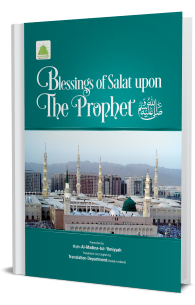
Quranic Exegesis
Prophetic Patience
Mufti Muhammad Qasim Attari
Allah Almighty has said:
اِنَّ اللّٰہَ مَعَ الصّٰبِرِیْنَ (۱۵۳)
Indeed, Allah is with the patient.[1]
Prophet Yūsuf’s patience
Among the patient servants of Allah, the status of Prophet Yūsuf عَـلَيْـهِ الـسَّـلاَم is uniquely distinguished. His own brothers conspired to kill him and he was thrown into a well. Later, he was taken out and sold as a servant in the market, as mentioned in the Noble Quran:
اقْتُلُوْا یُوْسُفَ اَوِ اطْرَحُوْہُ اَرْضًا یَّخْلُ لَکُمْ وَجْہُ اَبِیْکُمْ وَ تَکُوْنُوْا مِنْۢ بَعْدِہٖ قَوْمًا صٰلِحِیْنَ (۹) قَالَ قَآئِلٌ مِّنْہُمْ لَا تَقْتُلُوْا یُوْسُفَ وَ اَلْقُوْہُ فِیْ غَیٰبَتِ الْجُبِّ یَلْتَقِطْہُ بَعْضُ السَّیَّارَۃِ اِنْ کُنْتُمْ فٰعِلِیْنَ (۱۰)
Kill Yūsuf, or banish him to some faraway land, your father will then ˹only˺ focus on you. After that, become righteous people.” A speaker among them said, “Do not kill Yūsuf; rather cast him into the darkness of a well, a traveller will pick him up if you are to do something.”[2]
With the passing of time, he reached the palace of a king, whereupon he encountered conspiracies. He then endured the hardships of imprisonment, and by the grace of Allah, then became governor of Egypt. Even during his rule, a prolonged famine set in. From his childhood to governance of Egypt, he continuously faced tests. Despite these, he remained patient and content with the will of Allah, stating:
قَالَ لَا تَثْرِیْبَ عَلَیْکُمُ الْیَوْمَ ؕ یَغْفِرُ اللّٰہُ لَکُمْ ۫ وَ ہُوَ اَرْحَمُ الرّٰحِمِیْنَ (۹۲)
He said, “This day there is no blame upon you—may Allah forgive you; He is the most Merciful of the merciful ˹ones˺.[3]
Praising his patience and righteousness, Allah announced:
وَ کَذٰلِکَ مَکَّنَّا لِیُوْسُفَ فِی الْاَرْضِ ۚ یَتَبَوَّاُ مِنْہَا حَیْثُ یَشَآءُ ؕ نُصِیْبُ بِرَحْمَتِنَا مَنْ نَّشَآءُ وَ لَا نُضِیْعُ اَجْرَ الْمُحْسِنِیْنَ (۵۶)
And thus, We granted authority to Yūsuf in the earth to settle wherever he pleased. We bestow Our mercy upon whomsoever We will, and We do not annul the reward of the virtuous.[4]
Prophet Ayyūb’s patience
Prophet Ayyūb عَـلَيْـهِ الـسَّـلاَم was blessed with abundant wealth, land, livestock, servants, and children. When trials came his way, all of this was taken away. Due to the collapse of his house, his children were crushed and passed away. His servants disappeared, whilst all his animals died, including thousands of camels and goats. His fields and gardens were destroyed to the extent nothing remained.
Despite these severe tests, whenever he was informed of their loss, he would praise Allah and say, “What is mine? The Owner has taken back what is His; I had it for as long as He wanted, and He took it back when He willed. I cannot fulfil the right of gratitude towards Him and I am content with His will.” Following this, he was tested with physical illness, with the entirety of his sacred body being covered in sores. He continued to be patient and thank Allah.
Allah beautifully praised this quality of his as follows:
اِنَّا وَجَدْنٰہُ صَابِرًا ؕ نِعْمَ الْعَبْدُ ؕ اِنَّہٗۤ اَوَّابٌ (۴۴)
We found him to be patient. What an excellent individual he is! He is one who often returns ˹to Us˺.[5]
Prophet Ayyūb’s virtue of turning to Allah in testing times is mentioned in the following manner:
وَ اَیُّوْبَ اِذْ نَادٰی رَبَّہٗۤ اَنِّیْ مَسَّنِیَ الضُّرُّ وَ اَنْتَ اَرْحَمُ الرّٰحِمِیْنَ (ۚ۸۳)
And ˹remember˺ Ayyūb when he called out to his Lord, “Indeed affliction has befallen me and You are the most Merciful of the merciful.”[6]
Prophet Mūsā’s patience
The miraculous life of Prophet Mūsā عَـلَيْـهِ الـسَّـلاَم is evidence of his patience and resolve. He tended to the sheep of Prophet Shuʿayb عَـلَيْـهِ الـسَّـلاَم for many years, due to a promise he made. After receiving prophethood, he confronted Firʿawn and challenged the latter’s tyranny and claim of godship. He delivered the message of Allah's oneness despite Firʿawn’s oppression and cruelty being well known. He persevered through dangerous circumstances, when Firʿawn and his people sought to take his life.
The Quran mentions this as follows:
وَ قَالَ فِرْعَوْنُ ذَرُوْنِیْۤ اَقْتُلْ مُوْسٰی وَ لْیَدْعُ رَبَّہٗ ۚ اِنِّیْۤ اَخَافُ اَنْ یُّبَدِّلَ دِیْنَکُمْ اَوْ اَنْ یُّظْہِرَ فِی الْاَرْضِ الْفَسَادَ (۲۶)
And Pharaoh said, “Leave me to kill Mūsā, and let him call upon his Lord. Indeed I fear that he will change your religion or that he will cause discord to emerge in the earth.”[7]
After these hardships, he then faced the challenges of dealing with his nation, yet his patience did not waiver. The Prophet Muhammad صَلَّى اللّٰهُ عَلَيْهِ وَاٰلِهٖ وَسَلَّم eulogized him by saying, يرحم اللہ موسى قد اوذي باكثر من هذا فصبر - “May Allah have mercy upon Mūsā. He was tested with greater than this and remained patient.”[8]
Prophet Muhammad’s patience
When looking at the blessed life of Prophet Muhammad صَلَّى اللّٰهُ عَلَيْهِ وَاٰلِهٖ وَسَلَّم, one shall find it brimful with trials and hardships, which he himself described when saying, “Nobody was threatened or accosted more in the path of Allah than I.”[9]
Consider the continuous hostility shown by the disbelievers in Mecca, the accusations of sorcery, soothsaying, and insanity, the three-year boycott in the valley of Abū Ṭālib, the pain inflicted by the leaders and vagabonds of Ṭāʾif, his Companions being ill-treated, مَعاذَ اللہ animal entrails being thrown upon him whilst in prostration, his relocation to Madina, consistently engaging in battle with disbelievers and confronting the evil schemes of the hypocrites.
These were faced with immovable patience, profound strength, unshakable resolve, and unprecedented determination. He discussed the secret to his patience as thus:
O ʿĀishah! Indeed, Allah likes for the Highly Resolute (Ūl al-ꜤAzm) Messengers to remain patient upon worldly calamities and refrain from what is liked by the world. He then willed to oblige me with the same, which He did by declaring, فَاصْبِرْ کَمَا صَبَرَ اُولُوا الْعَزْمِ مِنَ الرُّسُلِ – So, ˹dear Beloved Prophet,˺ be patient just as the resolute Messengers were patient [10]
By Allah! It is necessary for me to obey Him. By Allah! It is necessary for me to obey Him! By Allah! I will show patience just as the Highly Resolute Messengers did, and strength is bestowed by Allah alone.[11]
As humankind grew in number, Allah initiated their reformation and the purification of their souls. For this purpose, He began sending His prophets عَـلَـيْـهِمُ الـصَّلٰوةُ وَالـسَّـلَام. The primary objective of their mission was to guide humankind away from the worship of false deities and call them to bow to the one true God, who is free from any partners. Throughout the course of this propagation, they encountered mountains of difficulties, but displayed distinct qualities like forbearance, patience, perseverance, tolerance, and forgiveness towards others.
This is evidenced by these examples of the prophets عَـلَـيْهِمُ السَّلَام:
* The long-term efforts of Prophet Nūḥ عَـلَيْـهِ الـسَّـلاَم to convey the message of Islam despite most people not accepting it.
* The casting of Prophet Ibrāhīm عَـلَيْـهِ الـسَّـلاَم into the fire, presenting his son as a sacrifice, and migrating hundreds of kilometres from Iraq to Palestine with his spouse and nephew.
* Prophet Ayyūb عَـلَيْـهِ الـسَّـلاَم facing various calamities, such as losing his children and wealth.
* Prophet Mūsā عَـلَيْـهِ الـسَّـلاَم enduring various trials and migrating to Egypt and Madyan.
* The troubles faced by Prophet ʿĪsā عَـلَيْـهِ الـسَّـلاَم and the martyrdom of numerous other prophets عَـلَـيْهِمُ السَّلَام.
These are all timeless and remarkable examples of patience. May Allah Almighty grant us a life of faith and well-being, and if any difficulty arises, may He bless us with the ability to show patience.
اٰمِیْنْ بِجَاہِ خاتَمِ النَّبِیّٖن صلَّی اللہُ عَلَیْہ ِوَاٰلِہٖ وَسَلَّمَ
[1] Al-Quran, part 2, Baqarah, verse 153; translation from Kanz al-ꜤIrfān
[2] Ibid, part 12, Yusuf, verses 9-10
[3] Ibid, part 13, Yusuf, verse 92
[4] Al-Quran, part 13, Yūsuf, verse 56; translation from Kanz al-ꜤIrfān
[5] Ibid, part 23, Ṣād, verse 44
[6] Ibid, part 17, Al-Anbiyāˈ, verse 83
[7] Al-Quran, part 24, Ghāfir, verse 26; translation from Kanz al-ꜤIrfān
[8] Ṣaḥīḥ Bukhārī, vol. 2, p. 442, hadith 3405
[9] Sunan Tirmidhī, vol. 4, p. 213, hadith 2480
[10] Al-Quran, part 26, Surah al-Aḥqāf, verse 35; translation from Kanz al-ꜤIrfān
[11] Akhlāq al-Nabī, p. 154, hadith 806

















Comments